Defending R&J: Why “Romeo & Juliet” is a Greater Story Than You May Think
A year ago tomorrow, I shared a post on five points that are often overlooked in William Shakespeare’s timeless play, Romeo & Juliet. Now I’m back and inspired to strongly defend it a second time. Nowadays, it’s “cool” to criticize this story and dismiss it as a silly tale about two naïve infatuated teenagers whose irresponsible actions cause the deaths of six people, themselves included. I know because I used to be one of said critics. Since recently starting to learn more about this play, however, I’ve come to the conclusion that people need to stop being so cynical and start making an effort to appreciate the story Shakespeare was really trying to tell.
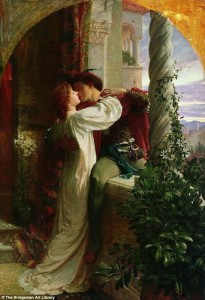
“Romeo and Juliet”, 1884, oil on canvas painting by Frank Bernard Dicksee
Fortunately, there are plenty of people who do understand what Romeo & Juliet is really about and who are more than willing to share their opinions on it. If you want to discover the real meaning of this story, start by following the “Defending RJ” tag on Tumblr. RomeoandJulietFan’s blog is also a must-read, as she does an excellent job of curating the best content defending this play. There are plenty of good points to be made on this side of the debate, but most arguments cover the same basic few.
So in the interest of revealing the true depth of this classic tale, today’s topic once again covers some important points often missed in my favorite Shakespearean play. Enjoy!
(Warning: the following post contains possible spoilers for Romeo & Juliet. If you’re one of the few people on the Internet who are not familiar with this tragic story, proceed with caution. Or you can just read a full summary of the plot here.)
True Love or Teen Fling?
This question seems to be at the heart of most R&J arguments, and understandably so. Still, it hardly makes sense to criticize a key element of a 16th-century play by 21st-century standards. While today it may seem silly to think two people can truly fall in love at first sight, remember that Shakespeare wrote his plays at a time when people thought fate was controlled by the stars and instant love was believed to be normal. It’s entirely possible that he did intend for his adolescent protagonists to be soulmates and for their love to be seen as genuine. There are several clues in the text to support this (one of my favorites being how the lovers’ first conversation reads as a sonnet), but the only way to know for sure would be to ask the playwright himself, so there may never be a definite consensus. It all comes down to interpretation.
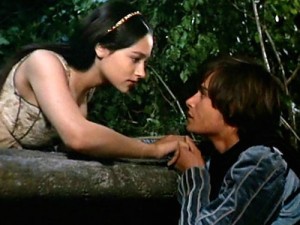
Leonard Whiting and Olivia Hussey (Romeo and Juliet, 1968)
So were Romeo and Juliet really in love, or did they just share a fiery passion that was doomed to burn out? This is the major point that most people miss: it doesn’t matter. Romeo & Juliet is a tragedy because whether their marriage was a testament to eternal love or a mistake made in the heat of the moment, they never got to find out. Had they lived in a different time or place where they didn’t constantly have to circumvent hostility, they could have been free to let their relationship run its course, however it might have played out. Instead, they meet an untimely end after an unfortunate mix-up forces them to make an unthinkable choice between (so they believed) facing life alone or being together eternally in death. Whatever their relationship was or could have been, it ended far too soon.
Which brings me to the next point…
Romeo & Juliet condemns Hate, not Love!
It baffles me how so-called R&J haters tend to blame the main characters for all the tragedies that unfold throughout the story (which I admit is ironic, given that I used to do the same). RomeoandJulietFan highlights this point perfectly in one of her rants: somehow everyone forgets that all the violence is a continuation of a feud established in the very first scene of the play, and not the fault of a couple of teenagers who were actually the only people from either family trying to escape the rivalry. Yes, Romeo and Juliet do make some poor choices themselves, but judging the completely natural impulsiveness of young people while excusing the irrational and destructive enmity of adults? Come on.
Now don’t get me wrong; in no way am I condoning the romanticization of teen suicide. But technically neither was Shakespeare. The message that should be taken from Romeo and Juliet’s deaths isn’t that lovers in a forbidden relationship should kill themselves, nor that teenagers who would willingly die for each other are stupid. It’s that hatred kills.
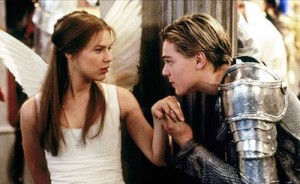
Leonardo DiCaprio and Claire Danes (Romeo + Juliet, 1996)
Think about it: none of the events leading up to the final tragedy would have happened if the Capulets and the Montagues had just gotten along from the start. Romeo and Juliet wouldn’t have had to keep their relationship a secret, Mercutio and Tybalt wouldn’t have died fighting for their houses’ honor, Friar Laurence wouldn’t have had to concoct the escape plan that failed, and these poor children never would have ended up in the depressing situation that drove them to suicide. By this logic, there’s only one conclusion that can be drawn from the plight of Romeo and Juliet: their families killed them.
So no, the real fools of the story are not the misguided teenagers who chose to pursue love against impossible odds. They’re the adults who should have known better, who should have invested their energy in lovingly raising their children instead of prolonging a feud that, as far as we can tell, had no justification to begin with. Not once throughout the entire play do we see Romeo directly interact with his parents; in fact, his only on-stage relationship with an adult is with Friar Laurence. Likewise, Juliet’s closest parental figure is her nurse, while the few conversations in which we ever see her parents express concern for her always have to do with marrying her off (to a complete stranger, no less). Even the friar and the nurse are guilty of making bad decisions, the former hatching high-risk plans that endanger the lovers’ lives and the latter abandoning her surrogate child in her hour of greatest need. However reckless the young protagonists may have been, it isn’t fair to criticize their poor judgment when it’s clear in the end that no one was there to protect them, whether it was from the feud or from themselves.
Taking all this into account, it’s actually quite amazing how greatly Romeo and Juliet contrast with every other character in the story. So perhaps we shouldn’t be focusing on their flaws so much as on their strengths…
Meet the real Romeo Montague and Juliet Capulet
R&J Hating 101 says that for every criticism of a bad decision made by one of the title characters, at least one reference must be made to their extreme youth. Yes, Romeo and Juliet were young, arguably too young for their story to have played out any other way. If you’ve jumped on this bandwagon, you’re no doubt overly familiar with the phrase “They were just kids!”, perhaps even having used it yourself.
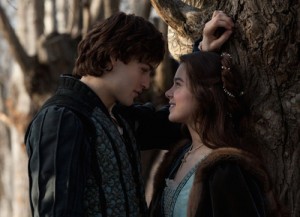
Douglas Booth and Hailee Steinfeld (Romeo & Juliet, 2013)
Well, guess what? You were a kid once too. There was a time when you too believed that love could conquer all, that there might be one perfect person out there for you and if you found them, everything in your life would magically fall into place because destiny said you were supposed to be together forever. The major flaw in the logic behind R&J bashing is that the very trait for which the main characters are criticized is precisely what makes them realistic and relatable. Romeo and Juliet behaved exactly as would be expected of people their age, and if you can’t for one second imagine yourself in their place and sympathize with these idealistic lovers, then frankly I feel sorry for you.
So now that we’ve established that Romeo and Juliet were young, naïve and impulsive (i.e. normal teenagers), let’s take a closer look into the iconic characters Shakespeare so carefully constructed.
Romeo Montague is the literary epitome of the passionate lover. This is clear from his introductory scene, which already has him reciting romantic poetry and lamenting over an unrequited love. Yes, he claimed to love a girl named Rosaline before he fell for Juliet, but as I’ve pointed out before, this switch is important to demonstrate the difference between an infatuated boy and a young man in love. It also gives us an insight into his most defining characteristic: he loves to love. The fact that Romeo grew up surrounded by hatred and still chose to pursue romance above all else speaks volumes of his inherently good nature, and that alone entitles him to a little credit, even admiration.
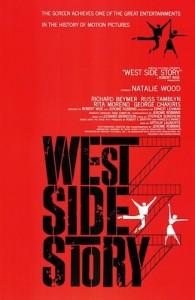
Poster for West Side Story (1961)
Some character analyses point out that Romeo’s intense love for Juliet is an extension of his tendency to exaggerate emotion altogether, and it’s this for which he’s usually berated by critics. True, he should not have let his rage over Mercutio’s death drive him to murder Tybalt, nor should he have been in such a hurry to die after hearing the news of his wife’s “death”. Yet one must ask: if Romeo had not been such an emotional person, would his war-abolishing affair with Juliet ever have happened in the first place? Of course we shouldn’t condone his terrible choices, but we should at least acknowledge that he’s a well-rounded character whose personality consists equally of virtues such as loyalty, courage and honesty. The complexity of Romeo’s character is what makes him such a solid pillar of one of the most enduring love stories ever written… as is the case of his complementary “other half”.
Juliet Capulet undoubtedly undergoes the most substantial development of any character in the story. Of all the misinformed comments I ever used to make against this play, the most embarrassing is by far mistaking this brave young woman for a foolish submissive child. Much like Romeo, Juliet is established early on as an independent thinker by showing no interest in the same matters as her family (in her case, marriage). Unlike her lover, however, she tends to be more rational and does not let her emotions completely drive her actions, which is actually quite outstanding for a teenager in love.
Juliet is only thirteen, yet people judge her decisions as though she should have made them with the experience of a woman three times her age. Hardly anyone seems to recognize how impressive it is that a girl that young is clever enough to pull an older boy out of his romantic illusions and into a serious commitment. Within the first few minutes of meeting Romeo, Juliet already calls him out on his clichés with a shrewd “You kiss by th’ book” (1.5.114) and consequently inspires in him some of the most iconic love poetry in the history of English literature. Also notice in the famous balcony scene (Act II, Scene II) that Juliet does not let her profound love for Romeo blind her into wholeheartedly accepting his declarations of love, but instead challenges him to prove his devotion by marrying her. Her decision to reunite with her husband after his banishment is not made in haste; however reckless you think she may have been, you can’t deny it takes remarkable courage to give up the security of family and social status in order to pursue happiness. Even Juliet’s suicide takes more daring than Romeo’s (stabbing being far more painful than poisoning), yet she remains loyal to him until the very end, never doubting for one second that her rightful place is eternally by his side.
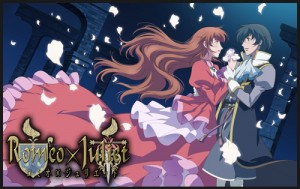
The star-crossed lovers as they appear in the anime adaptation, Romeo x Juliet
From my interpretation, Romeo and Juliet are a good match because they complete each other; Romeo is passionate and loyal, while Juliet is levelheaded and astute. As RomeoandJulietFan points out, the main characters likely connected so well because they were each exactly what the other needed at the time of their meeting. They were not simply hormonal teenagers acting out of lust; otherwise they could just as easily have given in to desire instead of getting married, or gone their separate ways at the first obstacle that forced them apart instead of striving to be together even in death. You can choose to believe it wasn’t true love, but you can’t say that what Romeo and Juliet had was anything but genuine.
Romeo & Juliet is far from an idealized love story, but that’s exactly the point. Young passion thwarted by circumstance is unquestionably the central theme of the play, and one can’t hope to appreciate Shakespeare’s beloved creation without making an effort to fully understand the intricate tale of star-crossed love that, 400 years after premiering on stage, still stands as a highly relevant theme in today’s artistic culture.
And if you still need convincing that all the hate around Romeo & Juliet is unjustified, do yourself a favor and read this post. It pretty much says it all.
I hope you’ve enjoyed reading about these important points of Romeo & Juliet! As you can see, this play is one of my favorites for several reasons, and I defend it in the hope that others may come to love it as much as I do. If you weren’t already, I hope I’ve made a Romeo & Juliet fan out of you! Thanks for reading!
References/Further Reading
- Sparknotes: Romeo and Juliet – Analysis of Major Characters
- Five Points You’re Probably Missing in Shakespeare’s “Romeo & Juliet”
- “Defending RJ” Tumblr tag
- Romeo and Juliet Fan – On the violence in R&J
- Romeo and Juliet Fan – Were Romeo and Juliet really in love?
- Madness Most Discreet – Defending “Romeo & Juliet”
What If? Writing Prompts: Love and Peace I
Here are some more “What If?” Writing Prompts for you. Similar to the set of romance prompts I shared a while back, today’s prompts focus on the general theme of love and peace. See what you can do with these and other like ideas. Even if you can only bring them to life in stories, it’s always worth a try to imagine what the world would be like if such ideas could become reality! Enjoy!
 What if… our religion was each other?
What if… our religion was each other?
If our practice was our life?
If prayer was our words?
What if the Temple was the Earth?
If forests were our church?
If holy water—the rivers, lakes and oceans?
What if meditation was our relationships?
If the Teacher was life?
If wisdom was self-knowledge?
If love was the center of our being?
(Source: “What If?“, a poem by Ganga White; submitted by Rebecca Braun)
What if… Romeo and Juliet had lived, and the feud between the Montagues and the Capulets could have been resolved without the need for death?
(Source: continuation of my train of thought on alternative Romeo & Juliet endings)
What if… wars could be resolved without the need for physical combat?
What if… less people judged each other based on race/gender/orientation/etc. and more people made an effort to accept others for who they are?
What if… there were no such thing as “forbidden love”?
Good luck creating your own stories about the triumphs of love and peace!
If you have any “What If?” writing prompt suggestions (for any theme), please feel free to share them in the comments below. Ideas I like may be featured in future “What If?” posts, with full credit and a link to your blog (if you have one)! Also, if you’ve written a piece based on an idea you’ve found here, be sure to link back to the respective “What If?” post. I would love to see what you’ve done with the prompt! Thank you!
What If? Writing Prompts: Mystery/Suspense I
Time for another set of “What If?” Writing Prompts. The theme of this week’s batch is mystery and suspense. I don’t have nearly enough experience writing in these genres, so I could definitely have some fun trying out these prompts! I hope you can too! Enjoy!
 What if… you found a wedding ring under your bed… that wasn’t yours?
What if… you found a wedding ring under your bed… that wasn’t yours?
(Submitted by: Doug Langille)
What if… you thought that strange noise in the house was your cat… only to discover your cat was in the room with you the whole time?
What if… you found an old letter hidden in a library book?
What if… that kind elderly neighbor of yours were keeping a dark secret?
What if… you woke up one day to find that nobody could see or hear you?
Good luck spinning twisted tales full of mystery and suspense!
If you have any “What If?” writing prompt suggestions (for any theme), please feel free to share them in the comments below. Ideas I like may be featured in future “What If?” posts, with full credit and a link to your blog (if you have one)! Also, if you’ve written a piece based on an idea you’ve found here, be sure to link back to the respective “What If?” post. I would love to see what you’ve done with the prompt! Thank you!
Finding Creative Inspiration in Dreams (Writers Reveal)
Welcome to the September round of Writers Reveal! This month’s topic was sent to us by Becky Fyfe of Imagine! Create! Write! Her prompt for us is “dreams”, so I decided to take advantage of the idea to write about a topic I’ve been meaning to share for a while: dreams as a source of creative inspiration. Thanks for the prompt, Becky!
The Stories Hidden in the Subconscious
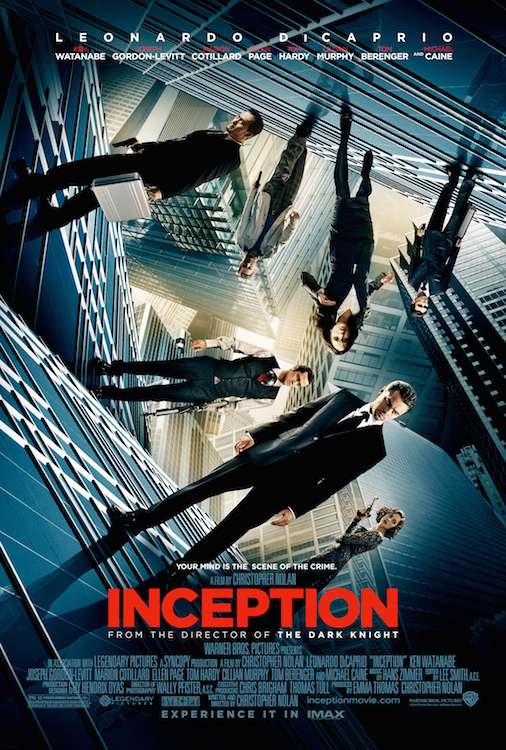
Movie poster for Inception (2010)
We’re all well familiar with dreams, those little “films” that play out in our heads while we’re asleep. Some people easily remember their dreams after waking up, while others recall them only once in a while. There are nights when we seem to have several and nights when we barely seem to have one. Dreams have been associated with prophecies, divine messages, our deepest desires and a strange combination of the things that happened to us the day before. But one thing they apparently have in common is that they’re a way for the subconscious to tell stories.
Dreams are a subject that I’ve always found intriguing. It’s one of the reasons Inception is on my list of favorite science fiction movies. I almost always remember my dreams when I wake up, and because of that, I’ve found plenty of inspiration for stories hidden in them. More than once, I’ve written a story based on an idea taken directly from a dream. Many of my dreams tell romantic stories, while others are full of action and adventure. I’ve had nightmares that inspired horror stories and euphoric dreams from which I was sad to wake up. My favorites even include some element of fantasy such as flying or breathing underwater. Yes, my dreams can get pretty bizarre, but I like to think they’re a reflection of my active writer’s imagination!
Harvesting Ideas from Dreams
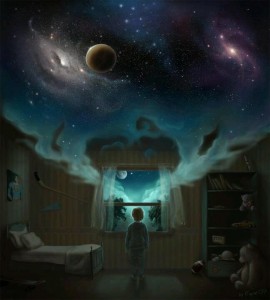 So how can you get the most use out of your dreams? It’s simple. If you’re lucky enough to remember your dreams after you wake up, I highly recommend writing them down. Dreams can be invaluable sources of story ideas, even if (and sometimes especially if) they’re confusing and surreal. If you tend to remember your dreams from almost every night, it may be good practice to keep a dream diary. Much like a regular journal, it can help you hold on to inspiration and can serve as a reference for ideas you didn’t even know you had!
So how can you get the most use out of your dreams? It’s simple. If you’re lucky enough to remember your dreams after you wake up, I highly recommend writing them down. Dreams can be invaluable sources of story ideas, even if (and sometimes especially if) they’re confusing and surreal. If you tend to remember your dreams from almost every night, it may be good practice to keep a dream diary. Much like a regular journal, it can help you hold on to inspiration and can serve as a reference for ideas you didn’t even know you had!
So writers, don’t take your dreams for granted. Embrace them, write them down, try to understand them (however incomprehensible they may be) and extract as many ideas from them as you can. There may just be a goldmine of creative inspiration in your own subconscious!
Do your dreams inspire you? What stories have you written based on an idea that came from a dream?
This has been a special topic post for Writers Reveal, a monthly blog swap among several talented writers. Be sure to check out the other blogs participating in the event. Thanks for reading!
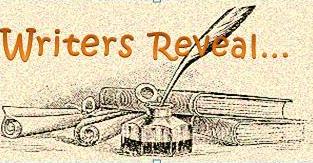
Other bloggers in Writers Reveal
Melissa Khalinsky: Melissa Writes
Becky Fyfe: Imagine! Create! Write!
Ashley Howland: Ghostnapped
Emily Hawker: You Learn Something New Every Day
Lee-Anne Walker: Is it just me?
We’re looking for more bloggers to join our circle! If you’re interested in participating in this monthly roundup, be sure to contact Emily Hawker so she can include you in our email list. Thank you!
Hitchcock’s Icebox: Fun with Fridge Logic
You know when you’ve finished watching a movie/TV show or reading a novel, only to suddenly realize hours later that there was something odd about the plot? Well, what you experienced was a trope known as Fridge Logic, that peculiarity in a story that only hits you in a moment of idle thinking. It’s an interesting concept with which I’m becoming increasingly familiar, so today’s creative writing post briefly covers what it is and what it means for fiction writers. Enjoy!
Why a fridge?

Huh, empty. Like the hotel room in that– Wait a minute…
No, this trope doesn’t necessarily have to do with an actual refrigerator. According to TV Tropes, the term “fridge logic” can technically be traced back to Alfred Hitchcock, who once referred to a particular scene in his film Vertigo as an “icebox scene”. In the words of the director, it’s the kind of scene that “hits you after you’ve gone home and start pulling cold chicken out of the icebox”. Basically, Fridge Logic refers to a special kind of plot hole that you don’t notice at first because you were so caught up in the story that you didn’t bother to think about consistency at the time.
So what does this mean for you as a writer? It means that no matter how well you try to get away with a plot hole in your work, anyone anywhere at any time is bound to find it. Of course, how much that really matters is a subject for another time.
The Other Sides of Fridge Logic
That moment of clarity that hits you at the fridge doesn’t always have to be a bad thing. Sometimes what you realize is the cleverness embedded in a certain story element. This is known as Fridge Brilliance. It usually refers to a part of a story that you didn’t care for at first, only to come to appreciate it after you’ve finally recognized the true meaning behind it. And that, in my opinion, is pretty darn cool.
Another form of Fridge Logic covers the other side of the spectrum, when something you didn’t really notice at first becomes terrifying in hindsight. This is referred to as Fridge Horror. As noted on its TV Tropes page, there are two kinds of Fridge Horror: the horrifying story elements that went over our heads as kids but that have become blatantly obvious to us as adults (Frozen-By-Time), and those that reveal themselves after we take the time to really think about their implications beyond the immediate story (Quickthaw). Look for these at your own risk: remember, anything awful you see in a beloved work of fiction cannot be unseen!
Fridge Logic has the obvious risk of slightly taking away from an otherwise good story, but you can’t deny that it can be tons of fun to discuss once you’ve experienced it. Plot holes should usually be avoided altogether, but if you absolutely must include some, try to hide them well enough that they only become clear in hindsight. At least then you’ll be giving your readers something extra to discuss after your story is over! Good luck!
Have you ever experienced Fridge Logic before? What sorts of plot holes have you found in your favorite works of fiction?
What If? Writing Prompts: Fantasy/Science Fiction I
Ready for another batch of “What If?” Writing Prompts? This week’s post features prompts in two of my favorite genres: fantasy and science fiction! Some clever writers over at Writer’s Carnival have offered interesting suggestions for “What If?” prompts, so be on the lookout for their ideas in this segment (two of them are in this post, while non-fantasy/sci-fi prompts will be featured in later posts). Thanks for the submissions, and be sure to keep the ideas coming! Enjoy!
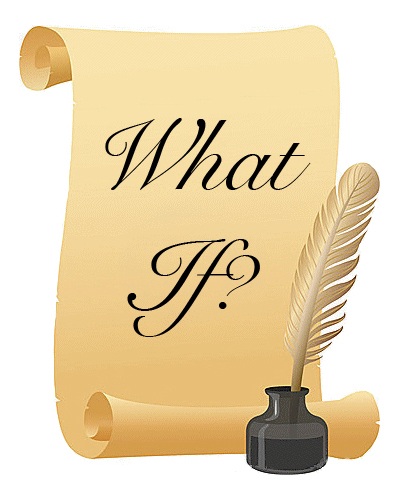 What if… you woke up in another world?
What if… you woke up in another world?
(Submitted by: Anisa, one of the founders of Writer’s Carnival)
What if… you woke up in the middle of the night to the sun shining through your window?
(Submitted by: Kelleigh, another of the people behind Writer’s Carnival)
What if… non-human animals were secretly more intelligent than people?
What if… you found out the forest near your house was home to countless mythical creatures?
What if… you knew one of your neighbors was an extraterrestrial… but you didn’t know which one?
Good luck exploring the wonderful worlds of fantasy and science fiction!
If you have any “What If?” writing prompt suggestions (for any theme), please feel free to share them in the comments below. Ideas I like may be featured in future “What If?” posts, with full credit and a link to your blog (if you have one)! Also, if you’ve written a piece based on an idea you’ve found here, be sure to link back to the respective “What If?” post. I would love to see what you’ve done with the prompt! Thank you!
Video Games as Interactive Storytelling
Today’s post is dedicated to a special someone with whom I love sharing this interest. If there are two passions responsible for bringing my best friend/boyfriend and me together, they are definitely creative writing and video games. So this week, I’d like to share a bit about our experience with video games and how they appeal to us as a method of interactive storytelling. Enjoy!
Escape into a Virtual World
The major debate of their positive and negative effects aside, we all have our reasons for loving video games. As a writer, one of my personal favorites is escapism, the chance to slip into a virtual world and experience a different life for a few hours at a time. Though it’s true that one can already achieve this through other sources of fiction such as novels and movies, video games bring that experience to life in a way no other medium can. When the real world becomes too boring or stressful, sometimes it’s nice to step into the metaphorical shoes of a fictional character and take back control of life. And while that may not be the healthiest solution to our problems, it certainly provides plenty of creative inspiration.

Mario (Super Mario Bros.), Sonic (Sonic the Hedgehog) and Link (The Legend of Zelda)
Growing up, I enjoyed embarking on adventures with Mario, Link and Sonic the Hedgehog, following a linear storyline to ultimately defeat a major villain and save the world. More recently, I’ve slain dragons and undertaken quests in the fantasy world of Skyrim, which offers a much broader terrain in which I’ve gotten lost for hours on end. I’ve defied the very principles of physics in the action/puzzle game series Portal; I’ve battled rebel spaceships in the strategy game FTL: Faster Than Light; I’ve witnessed my best friend construct his own story through the choices he’s made in the sci-fi game series Mass Effect; and we’ve both had our perceptions of reality challenged by the unique 2D/3D-crossover world of FEZ. From childhood to adulthood, my love for adventure games hasn’t changed, for not only do they provide hours of entertainment, but they satisfy my need to be told a good story.
Come for the Action, Stay for the Story
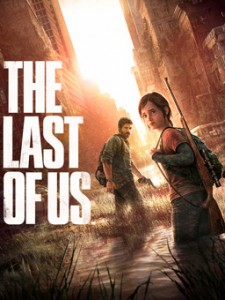
Joel and Ellie (The Last of Us)
Lately, I’ve been watching my best friend play the remastered edition of The Last of Us, a sci-fi/survival/horror game set in a post-apocalyptic United States. I had heard nothing but wonderful things about this game, including the fact that it had been awarded “Game of the Year” several times over, so of course I was excited when he offered to live stream his gameplay sessions for me. He warned me going in that it would be quite the emotional ride, and I have to say that so far, he’s been proven absolutely right. From the very first cutscene, the game sets up a tragic and at times horrifying sequence of events that is bound to touch the heart of any player willing to fully engage in the plot. Though I do enjoy watching the actual gameplay, I consider the highlight of the game to be the story at its core. As much in action as in narrative, The Last of Us is indeed a video game masterpiece.
While I will give many games a try for the promise of exciting gameplay, I’m prone to lose interest if there isn’t a gripping enough story to go with it. RPGs are my favorite game genre for a reason. Adventure is about exploring, gaining experience, overcoming obstacles toward a set goal and feeling accomplishment when the final mission is complete. And what is all that if not an interactive form of storytelling?
Make Your Own Story
Although video games tend to have a set storyline that a player is obligated to follow, there is the occasional game that offers the total freedom to explore and create your own path. The best example of this is probably Minecraft, a globally popular (read: 40 million players) sandbox game that many have equated with a sort of digital Lego platform. The reason? It’s pure creation. There is no story to follow, no boss to fight (unless you count the completely optional dragon battle in The End), no kingdom to rescue. The game simply provides an assortment of mobile creatures and all the building-block resources you need to craft tools, build structures, fight monsters and basically shape the continuously generating world however you want. It’s just you and your imagination.
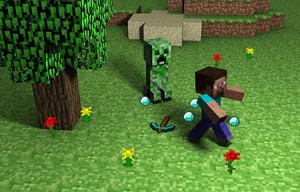
Steve running from a Creeper, the iconic monster of Minecraft
My best friend and I have been playing Minecraft together since the beta versions of 2011. I’ve long lost track of how many different worlds we’ve created and how many adventures we’ve had, but I’ve greatly enjoyed every minute we’ve spent creating together. One thing I love most is how the game brings out our individual characters: he’s more of an architect and an explorer, while I’m more of an artist and a farmer. Our playing styles may be different, but through combined effort, we’ve built cities, hoarded resources, survived monster attacks in the middle of the night and explored every terrain from the highest mountains to the deepest caves. In the world of Minecraft, we don’t need a predetermined plot to have hours of fun. We write our own stories.
Video games have their fair share of pros and cons, but when it comes to the creative aspect, they’re a unique source of inspiration. From writing video game fanfiction to finding ideas for original works, video games have been a big part of my journey as a writer, as they likely will be for years to come. And if nothing else, they make a great outlet for relieving the stress of a creative block!
Are you an avid gamer? Have video games ever helped you in your writing? What games inspire you the most?
Mario and Link belong to Nintendo. Sonic the Hedgehog belongs to SEGA. The Last of Us is a product of Naughty Dog and Sony Computer Entertainment. Minecraft is a product of Mojang. All official artwork is displayed for illustrative purposes only. I own nothing!
Dreaming Big (Writers Reveal)
Hello, and welcome to this year’s August round of Writers Reveal! First off, I’d like to welcome a new member who’s joining us this month: Lee-Anne Walker of “Is it just me?“. Welcome to the circle, Lee-Anne! Glad to have you with us!
Today’s topic was sent to us by Emily Hawker, who suggested the prompt: “when I grow up”. Since I’ve already written a nonfiction post about this topic for Writers Reveal in the past, I decided to use this second opportunity to write a short story based on that idea. I hope you enjoy what I’ve written. Thanks for the prompt, Emily!
Dreaming Big

Carl Fredricksen’s house, from Pixar’s UP (2009)
You have to choose one.
That was all Sophie had been hearing for the past two weeks. To say it was starting to get on her nerves was an understatement.
Everyone else already knows. You should too.
But how could she? There were so many options that it was impossible to pick just one! It was too much pressure from her teacher, from her parents, from society in general. Fourteen was too young to know what she wanted to be when she grew up, and anyone else her age who said they already knew was almost definitely lying.
“Sophie…” Ms. Miller took a seat at her desk after all the other students had left. “I understand this is difficult, but I really do need you to make a choice by Friday. This paper is part of your grade. I don’t want to have to fail you because of something so trivial. It doesn’t have to be your final decision for life; I’m only asking for three to five pages on a career that interests you now.”
The teenage girl looked down at the pencil she was nervously tapping on her own desk. It was hard enough to produce an essay about any topic, but having a separate deadline for the subject matter only made it all the more stressful.
“I need more time”, she muttered awkwardly for the third time since last Monday. “Can’t I just surprise you at the end of the month?”
The English teacher shook her head. “The reason I ask for the topics two weeks in advance is so you’ll all have plenty of time to write the actual essays. I don’t want you scrambling for something to write about at the last minute, otherwise your work will suffer. Please think about it, Sophie. I expect you to have an answer by Friday.”
On that cue, Sophie grabbed her backpack and headed out the door, leaving Ms. Miller to sigh in exasperation at an empty classroom. It was going to be a long week.
From that Monday afternoon to Thursday morning, Sophie questioned everyone she knew about their chosen career paths, and each of them seemed to have a different insight on the subject. Her father claimed to enjoy his job as a business executive, while her mother encouraged her to consider a career in the sciences. Her older brother, who had been working toward a football scholarship for the last year, said he might want to become a professional athlete. Her friends had already expressed interest in every profession from doctors and lawyers to astronauts and world-touring singers. Even her parents’ friends and her friends’ parents had some interesting input, as several of them had switched majors in the middle of college and others still had yet to figure out what they really wanted to do with their lives!
So many ideas had been contributed in the last few days that by the time Sophie sat down at her room’s computer desk on Thursday afternoon, her head was still spinning with all the possibilities. The problem was not that she didn’t want to try any of them; it was that she wanted to try all of them. How could she hope to choose only one career when they all sounded so appealing?
Frustrated, the teenager glanced over at her bookshelf. She couldn’t remember ambition ever being this overwhelming. She used to spend hours getting lost in her books, reading about people who sailed across the ocean or had adventures in the sky, who solved mysteries and saved lives and fought for justice, and she’d always wonder if real life could be just as exciting as the stories on her shelf.
And that was when it hit her. Perhaps there was a solution to her dilemma after all, a way she could give her teacher an answer while still staying true to herself. Suddenly inspired, Sophie turned back to her desk and began to type. She typed all through the afternoon and well into the night, pausing only once for dinner and stopping only when the final period had been placed on the very last sentence at a quarter to midnight. Breathing an immense sigh of relief, the 14-year-old printed out her work and shut her computer off to prepare for her first good night’s sleep in weeks.
The following afternoon, after the bell rang at the end of English class and all her peers had filed out, Sophie approached Ms. Miller at her desk.
“So, Sophie”, the teacher began, “have you finally come up with–?”
Her question was cut short when the teenager dropped a stapled stack of papers on the desk. The adult glanced at it in surprise before looking up at her student with a puzzled expression.
“What is this?”
“My essay”, said Sophie with a smile. “All five pages of it. I had to edit some stuff out to make it fit, but it’s all there.”
Ms. Miller was amazed. “How did you manage this?”
“I thought a lot about what you said, that I had to make a choice, and I realized – no offense – that you were wrong. I figured out a way that I can choose everything and still do something completely different from all of it. And now I finally know what I want to do with my life.”
The teacher picked up the paper to study it closely. After reading the title, Ms. Miller looked up at her student with a smile that suggested she had never been prouder of her. Sophie could hardly contain her excitement as she announced her dream with a broad grin.
“I’m going to be a writer.”
This has been a special topic post for Writers Reveal, a monthly blog swap among several talented writers. Be sure to check out the other blogs participating in the event. Thanks for reading!

Other bloggers in Writers Reveal
Melissa Khalinsky: Melissa Writes
Becky Fyfe: Imagine! Create! Write!
Ashley Howland: Ghostnapped
Emily Hawker: You Learn Something New Every Day
Lee-Anne Walker: Is it just me?
We’re looking for more bloggers to join our circle! If you’re interested in participating in this monthly roundup, be sure to contact Emily Hawker so she can include you in our email list. Thank you!
What If? Writing Prompts: Romance I
I’ve covered the question “What if?” pretty thoroughly in the last couple of weeks. On the off chance you haven’t had enough yet, here’s one more batch of “What If?” writing prompts for you, this time in one of my favorite genres: romance. See what you can do with these, and feel free to add more of your own! Enjoy!
 What if… love at first sight – true love in one look – actually can happen in real life?
What if… love at first sight – true love in one look – actually can happen in real life?
What if… Friar Laurence’s plan had worked, and Romeo and Juliet had succeeded in running away together?
What if… nobody believed in fate, but instead had to trust in their own abilities to find love?
What if… people only ever fell in love based on inner beauty?
What if… love is an emotion that isn’t exclusive to humans, but that any living creature is capable of experiencing?
Good luck spinning your own tales in the timeless theme of romance!
If you have any “What If?” writing prompt suggestions (for any theme), please feel free to share them in the comments below. Ideas I like may be featured in future “What If?” posts, with full credit and a link to your blog (if you have one)! Also, if you’ve written a piece based on an idea you’ve found here, be sure to link back to the respective “What If?” post. I would love to see what you’ve done with the prompt! Thank you!
What If? Writing Prompts: Fairy Tales I
Last week, I shared my thoughts on why I believe “What if?” should be every writer’s favorite question. In the interest of running with that idea, today I’m opening a new segment on my blog based on this fascinating “gateway” question: “What If?” Writing Prompts!
The purpose of this is to create a more interactive portion of my blog where anyone can contribute their ideas for collective creativity. With a hectic schedule coming up in my real life that will definitely keep me from writing as often as I like, outside contribution will be a big help to keeping my blog an active source of inspiration for readers in the near future. So please, don’t be shy about sharing your ideas; I would love to feature your prompts in future “What If?” posts, always with full credit and a link to your blog, of course! Thank you!
To start this segment off, here are five prompts I came up with based on the theme of reimagining classic fairy tales. See what you can do with these and how many more you can think up yourself! Have fun!
 What if… certain fairy tales were set in a different time/place/culture?
What if… certain fairy tales were set in a different time/place/culture?
(Source: various reimagined adaptations of my favorite fairy tales)
What if… that fire-breathing dragon the knight slew was really a divine guardian keeping an evil princess captive in order to protect the kingdom?
What if… the Fairy Godmother had actually sent Cinderella to the ball on a mission to kill the Prince?
(Source: music video for “Cendrillon“, a VOCALOID song by Signal-P featuring Hatsune Miku and KAITO)
What if… witches and wizards didn’t use magic to make amazing things happen, but real science instead?
What if… characters in fairy tales never fell in love at first sight?
Sure, these may not be outstanding, but at least they’re a start. Good luck reimagining your favorite fairy tales!
If you have any “What If?” writing prompt suggestions (for any theme), please feel free to share them in the comments below. Ideas I like may be featured in future “What If?” posts, with full credit and a link to your blog (if you have one)! Also, if you’ve written a piece based on an idea you’ve found here, be sure to link back to the respective “What If?” post. I would love to see what you’ve done with the prompt! Thank you!


Recent Comments